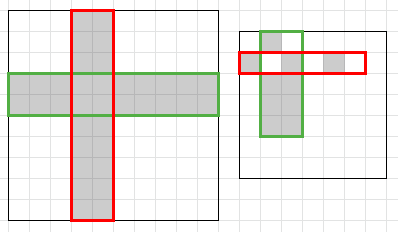Preparando MOJI
There is a square grid of size $$$n \times n$$$. Some cells are colored in black, all others are colored in white. In one operation you can select some rectangle and color all its cells in white. It costs $$$\min(h, w)$$$ to color a rectangle of size $$$h \times w$$$. You are to make all cells white for minimum total cost.
The square is large, so we give it to you in a compressed way. The set of black cells is the union of $$$m$$$ rectangles.
The first line contains two integers $$$n$$$ and $$$m$$$ ($$$1 \le n \le 10^{9}$$$, $$$0 \le m \le 50$$$) — the size of the square grid and the number of black rectangles.
Each of the next $$$m$$$ lines contains 4 integers $$$x_{i1}$$$ $$$y_{i1}$$$ $$$x_{i2}$$$ $$$y_{i2}$$$ ($$$1 \le x_{i1} \le x_{i2} \le n$$$, $$$1 \le y_{i1} \le y_{i2} \le n$$$) — the coordinates of the bottom-left and the top-right corner cells of the $$$i$$$-th black rectangle.
The rectangles may intersect.
Print a single integer — the minimum total cost of painting the whole square in white.
10 2 4 1 5 10 1 4 10 5
4
7 6 2 1 2 1 4 2 4 3 2 5 2 5 2 3 5 3 1 2 1 2 3 2 5 3
3
The examples and some of optimal solutions are shown on the pictures below.
